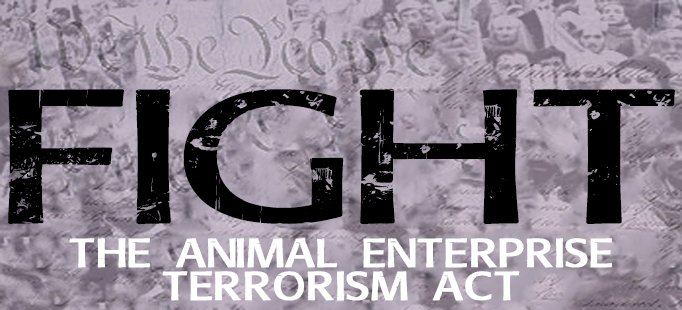THE ANIMAL ENTERPRISE TERRORISM ACT (AETA)
OUR FIRST AMENDMENT RIGHTS ARE UNDER ATTACK
The Animal Enterprise Terrorism Act (AETA) defines terrorism as causing any business classified as an "animal enterprise" (e.g., factory farms, fur farms, vivisection labs, rodeos, zoos and circuses) to suffer a profit loss. AETA is punishable by a prison sentence -- even if the company's financial decline is caused by peaceful protests, boycotts, media campaigns or leafleting.
Defining non-violent activist tactics, that cause exploitive corporations to lose profit but don't physically hurt anyone, as terrorism is both a deceptive misapplication of a serious term, and an unacceptable violation of our Constitutionally-granted First Amendment rights to freedom of speech. Industry groups pushed the AETA through Congress quickly and with little public scrutiny.
AETA was unanimously passed in the Senate on September 29, 2006, and on November 13, 2006, it was passed in the House with only 5 Representatives voting. President Bush signed AETA into law on November 27, 2006.
AETA’s penalties are harsh and excessive. The penalties are stepped, ranging from one to 20 years for economic damage alone. Prison terms are up to one year for no harm or damage or economic damage amounting to $10,000 or less and up to 20 years for the economic damage of over $1 million. These penalties far exceed those for otherwise violent or monetary crimes under the 2005 federal sentencing guidelines. Compare 20 years for profit loss to 4.5 years for sexual assault, 3 years for manslaughter, and 4 months for embezzlement.
Read the full legislative text of AETA here. And read a law review of AETA here.
REASONS WHY AETA IS DANGEROUS
1. It was passed by a voice vote of only five Representatives as a non-controversial bill.
Far from being non-controversial, AETA was explicitly opposed by more than 160 groups and thousands of constituents. The opposition includes such influential groups as the National Lawyers Guild., New York City Bar Association, Natural Resources Defense Council, Humane Society of the U.S., League of Humane Voters, Physicians Committee for Responsible Medicine, and the American Society for Prevention of Cruelty to Animals (ASPCA).
2. It is excessively broad and vague.
The Act defines an animal enterprise very broadly to include any enterprise that uses or sells animals or animal products. It also covers any person or entity having a connection with an animal enterprise. This combination includes virtually any enterprise. The Act does not specify that the interference be conducted for the purpose of protecting animals, so it applies to any form of advocacy. Moreover, the Act punishes mere attempts at interference as well as mere communication with individuals who attempt such interference. The net result is that almost any interference with virtually any institution across state lines could be charged under the Act. This may well include sending an e-mail across state lines that calls for picketing of a soft drink company that sponsors a rodeo.
3. It imposes disproportionate punishment.
Section 43(b)(1) of the Act provides a fine and imprisonment up to a year for actions that do not instill fear of bodily injury or death or cause any economic damage. Other penalties under the Act greatly exceed 2005 federal sentences for comparable offenses reported by the U.S. Sentencing Commission.
4. It brands advocates as ‘terrorists’ and denies equal protection under the law to advocates.
Despite its broad and vague wording, the Act clearly intends to single out animal advocates for ‘terrorist‘ branding and severe federal penalties. Individuals charged with terrorism face ostracism and hardships.
5. It brands advocates as ‘terrorists’ and imposes severe penalties on civil disobedience.
The Act provides particularly severe penalties for nonviolent illegal activities like civil disobedience, which has been the most effective tactic of the civil rights and other social justice movements. The brave activists who crossed state lines to sit in at “white only” lunch counters could have been branded as ‘terrorists’ and charged under the Act.
6. It has a chilling effect on all forms of protest by endangering free speech and assembly.
The prospect of costly fines and long prison terms is likely to deter much social justice and life-affirming activists from engaging in protest activities because most of their target enterprises fall within the Act’s broad definition. For example, students protesting low wages or high tuition at a university could be charged under the Act because the university is an “academic enterprise that uses animals … for education, research, or testing.”
7. It sets back investigation of federal law violations by animal enterprises.
Many of the biomedical enterprises that promoted the Act are repeat violators of federal law dealing with animal welfare. Much of the evidence leading to these convictions has been procured through undercover investigations, or whistleblowing, which are outlawed under the Act.
8. It detracts from the prosecution of real terrorism against the American people.
Since the tragedy of 9/11, U.S. law enforcement agencies have been successful in preventing similiar terrorist activities. Yet, their resources are taxed to the extent that they are unable to adequately monitor our borders, ports, trains, chemical plants, water purification plants, and other potential sources of terrorist activity. Monitoring social activists imposes an unnecessary and misdirected additional burden on these agencies and threatens their continued success.
For information on legislation that can hurt animal activists, visit www.GreenIsTheNewRed.com
HOW YOU CAN HELP
Although AETA has been passed into law, you can contact your state representatives to let them know that AETA is dangerous legislation that should be repealed.
Find your federal and state elected officials here.
